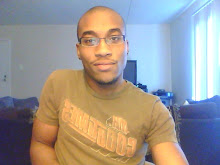
Disclaimer: this post was written in parts, so it isn't as cohesive as it would've been had I not been lazy.
It's the day after my birthday, and I'm sitting on my parent's couch--smiling. I forget sometimes how good it is to be alive, how comforting it is to be around people who love you. With all of the deadlines, the unspoken expectations and the drama of intellectual performance, the real things--the things that matter--often get overlooked. For the moment though, my eyes are wide open, and I am immensely grateful.
* * *
I've been reading a book for the last couple of days (research, for pleasure!) and soaking in the happiness that comes with minor victories. I made it through my first year. It may not seem like much to many, but to me, it proves that I might be capable of something--even if that something is (frustratingly) veiled by time. Even in the midst of the reverie, I can't help but wonder how things will turn out in the years to come. But I'll get back to that in a minute.
* * *
The book I've been reading is Walter Mosley's Blue Light. Now I've only read half of it (some books, like foods, are meant to be savored), but the half I have read has been devastating in the most interesting ways. The book is a serious one. There are moments in the narrative that I have to laugh to keep from falling into a pit of despair; at those times I find my self thinking that there has to be some core connective system that keeps us (humanity) afloat. I mean, can we be so intrinsically "flawed" that we're always teetering on the edge of self destruction? The answers that Mosley provides to this one, fundamental, question hurts at times; turning the page is often like pulling the trigger in a game of Russian Roulette.
I've always heard that a good read causes you to question things, inspires you to re-consider things, pushes you to set aside the accepted (in whatever form it takes) in order to perceive the possibility of an alternative place or space. In some works the place is fantastic; in others, the space is all too real. Either way, the "actual" is only as legitimate as the dots the reader connects in his/her head. Blue Light is so disturbing because the dots are located in some pretty tender places. The more I read the book, the more I realize that the type of fiction it represents (which is difficult to pin down) is about as close to "real" as anything gets. It foregrounds a sort of intellectual and experiential symbiosis that we seem to be careening toward, and, at the same time, presents a pervasive propensity for self-sabotage. It seems to be senseless, but I'm wondering if its not purposeful--which leads me to what I said I'd get back to.
Reading, thinking, and writing about this stuff makes me happy, despite its obviously depressing aspects. I know that none of it is new and that it is essentially the same fundamental struggle that has kept us going through the ages, but sometimes, I think the move toward specialization (I'm speaking about my field, though I'm sure it's a pretty common trend) does nothing more than obfuscate the crap that's as plain as day--the reality that inspires fiction and the fantasy that seeks to change reality. This is why I'm always preoccupied with how things will turn out and why, like Andrea, I'm at a loss as to what I'm going to become; I doubt very seriously that I'll be able to contribute to the incestuous body of bulleted references and regurgitated "original" ideas. At the same time, I love talking about foundational issues that rear their respective heads in every utterance and through every system of social ordering, so I'm sure what I present is bound to fall into the trap of intellectual inbreeding that I've just pointed out. But I guess my way around this is to work on the periphery. You see, I too like to talk about the tangents because they belie connections that a central "focus" is often too busy to acknowledge; they serve as examples of how certain issues create a web of association in seemingly disparate elements that coalesce and counter "centrality." Maybe this post is an example. It's definitely unfocused enough...
What I'm getting at is that the picture of humanity that Blue Light and other such works presents is one that needs to be more than observed. It's one thing to recognize the overarching motifs in a work (the focused, specialized, detachment is safe and not without its interests), but it's something else entirely to understand that the ordered chaos that a work presents is as much a charge as it is a portrayal. I'll stop here, because I now recognize that I've entered into rant mode. But I look forward to reading the rest of the book as much as I look forward to seeing if my attitude will get me anywhere. At this rate I'm looking forward to a cardboard box next to a recycle bin (at least I'll be environmentally conscious) and a nicely framed diploma.





No comments:
Post a Comment